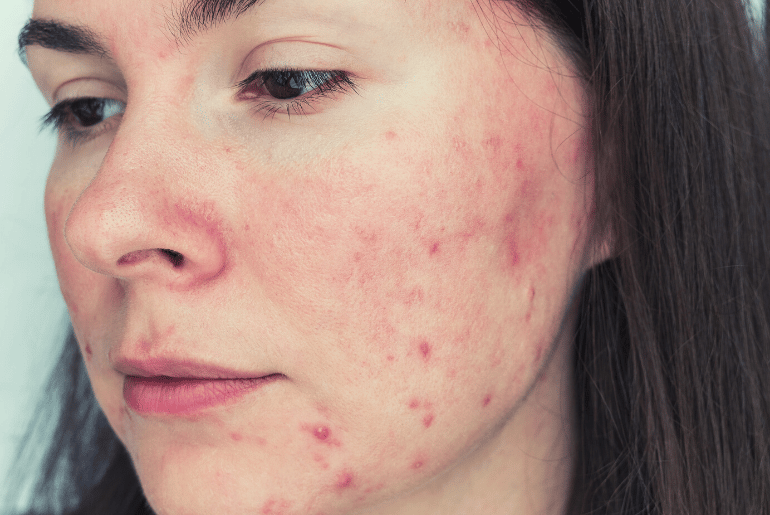Rosacea is a persistent skin condition that impacts millions of people. Rosacea has no recognized cause, and there is currently no cure. However, doctors have been able to find ways to treat the illness by decreasing its symptoms.
Rosacea is divided into four types. Each subtype presents its own set of symptoms. It’s possible to have more than one type of Rosacea simultaneously. Rosacea is characterized by small, red, pus-filled pimples on the skin that appear during flare-ups. It usually affects only the skin around your nose, cheeks, and forehead.
Rosacea Symptoms You Should be Aware of
The most common symptom is redness on your cheeks, nose, chin, and forehead. The color will appear on your neck, head, ears, or chest less frequently.
Broken blood vessels may appear through your skin after a short period, thickening and swelling.
You’ll also experience the following symptoms:
- Your skin is stinging and burning
- Rough, dry skin patches
- A bulbous, bulging nose
- Large Pores
- Your eyelids have cracked blood vessels.
- Bumps on the insides of your eyes
- Vision problem
If your face appears blushed and you get little bumps that look like inflammatory disease, the chances are that you’re suffering from Rosacea. To manage your symptoms, your doctor will provide medicine and alternative treatments, and there are several things you may do to make yourself look and feel better.
Read: How to Know If You Have Rosacea – Signs and Symptoms
7 Effective Tips to Calm Rosacea

1. Light cleansers should be used for cleansing
A harsh skincare product is another rosacea trigger. Make sure you’re cleaning your skin with a gentle, pH-neutral cleanser twice a day. Alcohol, aroma, sodium lauryl sulfate, lactic acids, and glycolic should all be avoided. Rosacea sufferers and people with sensitive skin will find them to be quite irritating. Try using fragrance-free cream-based cleansers or fragrance-free oil-based cleansers if you’re trying to get rid of Rosacea.
Read: How to Clean Your Face Naturally Everyday
2. Sun protection is essential.
Sun exposure and UV rays are the most common causes of Rosacea. Protect your skin from the sun. When looking for a safe acne rosacea cream, experts recommend looking for a sunscreen that is fragrance-free, broad-spectrum, contains zinc oxide, and has an SPF of 30 or higher. If you have acne rosacea, do your homework first before applying a cream, as some of them contain inflammatory or pore-clogging chemicals.
3. Moisturize To Manage Rosacea
Moisturizer is an essential rosacea skincare product. Rosacea patients should apply a moisturizer regularly. Moisturizers form a barrier that keeps irritants out and may help keep symptoms in control but choosing the wrong moisturizer will worsen your redness. The fewer ingredients, the better. Always choose an oil-free, fragrance-free, and hypoallergenic moisturizer.
4. Go for mineral-based, fragrance-free makeup.
Makeup is also used to hide rosy cheeks, but it can also aggravate acne rosacea symptoms. Use fragrance-free, mineral-based cosmetics. This is significantly less irritating to the skin than other types of makeup. Any acne rosacea makeup formula is very important. When picking a foundation, dermatologists advise using pressed powder over liquid versions because liquid clogs pores and exacerbates acne rosacea symptoms. If you’re not sure how a product may affect your skin, consult a doctor first.
5. Cause of skin irritation
While there is no cure for acne rosacea, therapies are becoming more targeted to people’s specific acne rosacea symptoms. Topical and oral treatments, such as creams, lotions, gels, and oral pills, may help reduce inflammation and redness. Topical and oral antibiotics come into play if you have a lot of pimples and breakouts with acne rosacea. Those with dilated blood vessels, permanent redness, and other problems on the nose and cheeks may benefit from surgical options such as laser treatment or intense pulsed light. Ask your doctor to double-check that you’re doing everything you can to alleviate your symptoms.
6. Consume ample water
A well-hydrated system is important for overall health, and those with skin issues should avoid dehydration because it can induce flare-ups. Begin drinking more water as soon as your skin begins to flush – the sooner you start hydrating, the faster it will take effect. Drink cool water to keep yourself cool; however, avoid drinking ice cold water or ice or anything that will shock your system. You’d end up worsening your flare-ups if you did something like that.
7. Avoid alcohol and spicy foods
Several people’s acne rosacea is triggered by food and alcohol. Alcohol and spicy meals are common flare-up causes. To see if your symptoms improve, you’ll find it beneficial to eliminate these foods from your diet for several weeks. There are a variety of other food and drink triggers that people encounter. Keeping an acne rosacea journal in which you mention your symptoms after eating a certain food or drinking a certain drink will help you identify any triggers that you should avoid in the future.
Read: 10 Foods for Natural Skin Repair According to Dermatologist
Other Important Tips to Consider
1. Avoid Stress
Stress is a major factor in flare-ups. Dermatologists claim that stress can increase the production of certain neuropeptides and neurotransmitters in the skin, resulting in inflammation and blood vessel dilatation, leading to redness. These symptoms will cause stress to build up, resulting in a cycle of stress regeneration and worsening symptoms.
To prevent acne rosacea symptoms, stress management is essential. There are various options for dealing with stress, including mindfulness, breathing techniques, and regular exercise. You should keep track of what makes you stressed to take efforts to handle the stressors.
2. Follow Skincare Regime
- How you care for your skin and what you put on it impacts the symptoms you’re experiencing. Acne rosacea sufferers will often discover that their skin is sensitive and may follow the following treatment regimen:
- Wash your face with warm water and a gentle pH-neutral cleansing product every morning and evening. Soap and perfumed or alcohol-based cleaners should be avoided.
- If your skin is itchy, use a fragrance-free, non-comedogenic moisturizer.
- If you must wear makeup, stick to water-based products that are ideally non-comedogenic.
- Try to stay away from any products or procedures that irritate the skin. Perfumes, alcohol, menthol, witch hazel, essential oil, camphor, clove oil, peppermint, sodium lauryl sulfate, and lanolin are all components to avoid.
- Men with acne rosacea should shave their faces with an electric razor rather than a blade.
Cycles of flare-ups are common, and this means that you can have symptoms for weeks or months at a time, then they will fade away and return. Follow a proper skin care regimen to keep your skin healthy and away from Rosacea.





[…] 7 Ways How to Calm Rosacea Flare-Up Fast […]
[…] Read: 7 Ways How to Calm Rosacea Flare-Up Fast […]